
Keeping Company
By Meira Greenfeld
Come pause and keep company with me as we explore what shapes our identity and uncover common "stuck points" that keep us from living at our fullest potential. In this podcast I'll share my thoughts and bring in guests to discuss what it means to live in integrity with yourself and how you can develop personal fulfillment and authentic relationships.
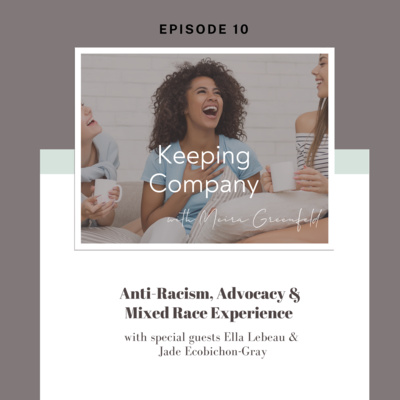
Keeping CompanyMar 31, 2021

Episode 11: Making Anti-Oppression Work Workable
After a hiatus that was much longer than I anticipated, I am hopefully back in the swing of things with an episode about the general malaise that many involved in diversity efforts, social justice or anti-oppression work appear to be experiencing. It was hard not to get caught up in the momentum of what seemed like a pivotal moment for permanent change after thousands took to the streets to protest the death of George Floyd. Time will only tell what the sustained progress has been. There are so many ways that one might measure such progress.
The protests seemed diverse with people of different ethnicities throughout the world taking a stand in support of US protestors. Still, those who have kept up the work seem to share a concern that in many ways, it’s back to business as usual because people are exhausted. There as so many things competing for our attention: Financial issues, unemployment, a war in the Ukraine.
So, I propose that we slow down to explore how we can continue to keep our focus on anti-oppression in a way that sustains action without being, well, oppressive.
Some highlights:
· Learning about oppression is a real downer. It isn’t always energizing and can result in feelings of guilt, shame or defensiveness.
· Figuring out the right course of action isn’t always so simple if you’re exhausted, not terribly inspired to help “others” with a problem that’s “over there” and distant from immediate and personal concerns.
· Oppression is often internalized and ubiquitous so it’s hard to recognize when we’re not perpetuating oppressive forces.
· Slowing down can help build presence and help us shift from autopilot.
· How to do anti-oppression work with humility without feeling like a wimp.
Interactive Workshops
My workshops are designed to be interactive with time in between sessions for participants to integrate their learning. You may participate anonymously
and/or submit your questions ahead of time to incorporate your concerns or interests into the workshop. They are compassionately priced so you can attend as many or as few sessions as you would like in a series. Here’s where you can find my current workshops where you can continue to do this work with
others who (are also tired), but wish to keep the momentum going:
http://bit.ly/3JPp0Y2
Where You Can Stay Involved
If you would like to hear more, be sure to subscribe to this podcast, if you haven’t already, so you don’t miss upcoming episodes and also join our community so you can tune in and participate in live events.
You can learn more about restorative justice and decolonization by following me on social media on Instagram, on Facebook in an online supportive community for anti-oppression advocacy or on my website providing education, marketing and racial trauma training for individuals who wish to explore racial bias, reflect and seek guidance or support in these areas.

Episode 10: Anti-Racism, Advocacy and Mixed-Race Experience
Welcome to Part #1 of my coffee chat with my wonderful guests Ella and Jade who join me in table-talk regarding our thoughts about mixed-race experience. We really had no firm idea about what we might discuss. It was an exhilarating experience to give voice to our collective thoughts as they evolve. In this episode, we share our experiences growing up with a multicultural background that includes some shifting of identity as the numbers of multiracial individuals has increased. We also touch on the impact of protests following George Floyd’s death on self-identity, privilege and colorism. What makes the discussion particularly interesting is our span of generations and also background.
Jade Ecobichon-Gray is the founder of Mindset Matters UK, a social wellness consultancy that works with organisations to embed wellness programs based on social justice principles. With a career spanning addiction recovery, mental health, reducing reoffending and organisational change, Jade is a straight-talking social wellness advocate. As a mixed-race woman Jade is passionate about anti-racism work and is currently working with the Government of Jersey and Jersey heritage regarding the decolonisation of education, history and the arts. She lives in the Channel Islands where she was one of only a few mixed-raced children on the Islands.
She can be found on @mindset_matters_uk – Instagram and her website
https://www.mindsetmatters.uk. One of her more recent blogs discusses “unpacking mixed fragility.”
Ella is twenty years old and in her second year at Oxford University, where she studies English and German. She also works for a magazine called Onyx which was created by Black Oxford students and which features only Black creatives, when she isn’t modelling, studying or painting! I encountered Ella on her very popular Instagram account @ella.lebeau where she was passionately advocating for more Black students to apply to Oxford University.
Interested in experiential learning and discussion on raising mixed-race children? Check out my new workshop Raising Mixed-Race Children that guides you through support for your children’s identity and a deeper understanding of issues they may face in today’s changing racial climate: https://bit.ly/3rzLj7z
You can learn more about restorative justice and decolonization by following me on social media on Instagram, on Facebook in an online supportive community for anti-oppression advocacy or on my website providing education, marketing and racial trauma training for individuals who wish to explore racial bias, reflect and seek guidance or support in these areas.
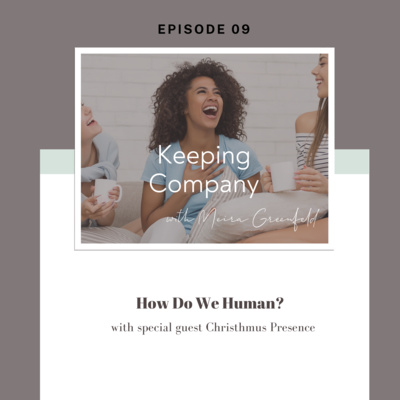
Episode 9: How Do We Human?
Welcome to Episode 9 of Keeping Company where I continue discussion with my guest is Christhmus Presence. To recap, Christopher is an advocate for restorative justice and practices in the Bay area. He is the founder of Therapists of Color for Social Justice, a collective of Bay Area therapists of color who are committed to supporting social justice & BIPOC Community healing via mental health. He also runs a number of Black-Indigenous-People-Of-Color (BIPOC) Telehealth Groups for adults and also 7th and 8thgraders. He also facilitates Asian Pacific American therapy groups.
You can find out more about what Christhmus Presence is doing at www.christhmuspresence.com or follow Therapists of Color on Instagram.
In this episode, we continue to discuss decolonizing therapy and exploring ways to be human. We delved into intuitive ways that were part of ancestral history that are very liberating to BIPOC individuals and help them heal.
Chris notes we are born with high sensitivities and then this dampens over time so that we are not overwhelmed. In many ways so much of our existence is disavowed and in so many contexts. We can’t begin to talk about healing without discussing what is considered normal and how mainstream ideas of normal disavow the experiences of so many.
I open the episode asking Chris how he might describe people who connect in ways that are beyond the use of words and follow their emotions.
You can learn more about restorative justice and decolonization by following me on social media on Instagram, on Facebook in an online supportive community for anti-oppression advocacy or on my website providing education, marketing and racial trauma training for individuals who wish to explore racial bias, reflect and seek guidance or support in these areas.
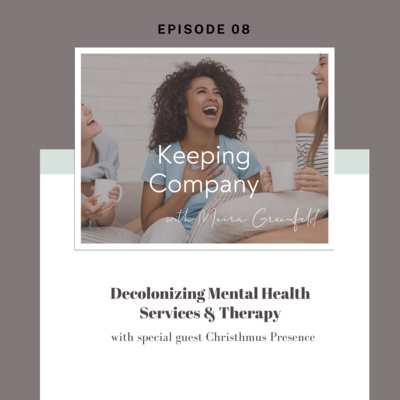
Episode 8: Decolonizing Mental Health Services & Therapy
This week, I really had my work cut out for me with spelling. Do you find sometimes that there are just some words you perpetually have to keep looking up? One of mine is Presence. Yes, it’s one “s’ followed by a “c.” I mention this because this week’s guest is Christhmus Presence. And I can’t spell that either. There’s an “h” after the “t.” I’m embarrassed to say that it took me a while to realize that my guests name rhymed with seasonal gifts. Christmas Presents?
Anyway, you’ve perhaps heard of a Renaissance Man, well, Chris is one. Not in that debonair or arrogant way, but in the literal sense of someone with a vast number of talents and areas of knowledge.
He’s definitely absorbed a ton of wisdom in his years, but you’ll probably not find anyone as humble. Though we recorded this last season, his gentle spirit still casts a warm and fuzzy glow. Christopher is an advocate for restorative justice and practices in the Bay area. He started Therapists of Color for Social Justice.
I would be remiss if I didn’t highlight that he runs a number of Black-Indigenous-People-Of-Color (BIPOC) Telehealth Groups for adults and also 7th and 8th graders. He also has Asian Pacific American groups. These are donation based groups that run ten weeks run by clinicians of color.
You can find him on his website as Christhmus Presence at www.christhmuspresence.com.
In this episode, we discuss ways in which to decolonize behavioral health and open up ways of healing that go way beyond talk therapy and are particularly restorative for people of color. Chris notes that there is no text book on how to decolonize the white institution of therapy.
When we allow our own DNA to resonate in a way that is not titrated though English, the language of the oppressor of many BIPOC individuals, it allows us to put other things into the frame of our healing beyond traditional therapy. We discuss how there’s something beyond English that’s held in our bodies which non-traditional healing can help us access.
You can find me on social media on Instagram, on Facebook in an online supportive community for anti-oppression advocacy or on my website providing education, marketing and racial trauma training for service providers interested in self-reflection regarding implicit bias or understanding BIPOC perspective.

Episode 7: Cultural Appropriation, Excrement on Capitol Hill & The Productivity Treadmill
I’m all for evolving in our identities, but I wasn’t done processing Hilaria Baldwin’s strange response to being called out for some rather bizarre inconsistencies that come across as….manipulation?? I wish she had entertained dialogue about it instead of defensiveness.
I’ve also been curious about why the violent individuals who attacked the Capitol Building and sought to harm our leaders brought excrement into the picture. Other than just being plain disgusting, was there some intended message of symbolism? Apparently, it was quite the effort and seemed strategic.
Are you tired? Everyone seems fatigued. This was the reason for my recent retreat. It felt like the only decent thing to offer community. I have been wondering why in the middle of a pandemic, we are still hearing so many external messages that appear to promote burnout. I know the hustle is on to find income and perhaps replace it, but we also need to heal. So many people are stressed and anxious. The chaos seems relentless, notwithstanding a new administration.
In this episode, I offer insight into my new meditation that I hope you’ll check out.
History of excrement
https://www.dailynews.com/2016/12/25/santa-monica-synagogue-entrance-smeared-with-feces-food-on-hanukkah
https://www.vice.com/en/article/wd7n8z/a-brief-history-of-people-protesting-stuff-with-poop-197
Retreat
https://pages.meiragreenfeld.com/rememberwhyretreat
Facebook Community
https://www.facebook.com/groups/comingbacktocenter/
Instagram
https://www.instagram.com/meiragreenfeld
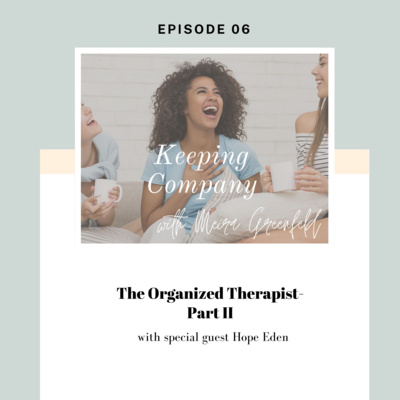
Episode 6: The Organized Therapist-Part II
Yes, it’s been a while since I've produced an episode. Hope and I had this discussion in October! Well, you know that time in 2020 did not run under the same laws of nature. In an upcoming episode I will share why I dropped off the globe for a month in 2020. I’m back with gusto to do my part helping us all get out of survival mode.
In Part II of my interview with Hope Eden, I continue our discussion of interdependency and Hope expounds on what she calls “sacred geometry in action.” We discuss how the internet is expanding connection on a biological level.
When I last spoke with Hope, she shared her work helping therapists get organized with trainings and helpful assets. She is trying to make the admin work therapists have to endure easier to automate into everyday practice. Which therapist wouldn’t want that? In addition to her three Facebook groups for therapists, she has a new app that provides some of the features of Facebook, but in a more therapist friendly environment. Hope also has the credentials and skills to help therapists get organized in the macro political sense which is right up my alley. After all, the personal is political and the political has a much larger impact on our understanding of mental health than is openly acknowledged.
In today’s episode, Hope shares her "foundational work" in which she engages with every single client.
You can discover more of what she has to offer in her new app Organized Therapist App that is alternative to Facebook. You can also find her here: Facebook: The Organized Therapist.
___
I help individuals transcend feeling like cogs in the machine, stand strong in their own power and choose the path forward that will lead to the most fulfillment. You can find out more about that if you SIGN UP for our upcoming FREE RETREAT. At least, check it out!
You can find me on social media on Instagram, on Facebook in an online supportive community for self-discovery and values-based living or on my website providing anti-racist advocacy, education, marketing and diversity training for professionals wishing to navigate corporate and personal without giving up self or values. The next diversity training is January 24, 2021. This will be on Cultivating Advocacy and Inclusivity in Healing Spaces.
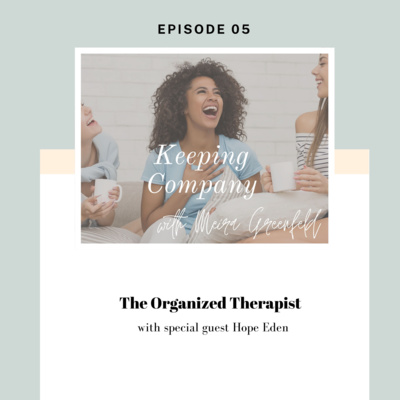
Episode 5: The Organized Therapist
I’m very excited about today’s guest Hope Eden. First off, what a lovely name! It just inspires, well…hope. Hope is as inspirational in person as is her name. Her energy is so calming and within that calm is determined compassion.
Therapist extraordinaire and innovator, Hope has a significant following on Facebook where she is the administrator of a number of groups centered on organization in the fullest sense of that word. She helps therapists organize from within and without which is really the framework from which she operates. Hers is one of the few Facebook groups in which members openly discuss political topics with emotion, sincerity, and respect. This is too rare a creature particularly in groups dominated by therapists many of whom still maintain that therapy and politics should remain separate. (More on that in an upcoming podcast).
With a background in Interpersonal and Organizational Communication from the University of Delaware, (Joe Biden’s alma mater), Hope is “absolutely in love” with “following novelty” and has a knack for the aesthetic in temperament as well as design. In her words, her orientation is to start from the outside in with regards to healing and she has a unique process for doing this. She's an organizer in the activist/community sense and in the clean desk and daily planner/template sense. Listen in and you'll know what I mean.
In this first part of my chat with Hope, we discuss leadership and serendipity. So apropos given the current climate and serious concerns regarding the rise of authoritarianism in the United States. How much of our life is random and how much is predestined?
Hope’s accomplishments are an example of how we can each take our personal convictions and manifest them in ways that can promote tangible change. She’s creating change in so many therapists’ lives right now. I do hope you’ll check out her activities especially if you are in the mental health field.
You can discover more of what she has to offer in her new app Organized Therapist App that is alternative to Facebook. You can also find her here:
Facebook: The Organized Therapist
As a business strategist and mindset/identity coach, I help people see who they truly are and through that knowledge, that self-knowing, I help them stand strong in their own power and have the courage to choose the path forward that will lead to the most fulfillment. You can find me on social media on Instagram, on facebook in an online supportive community for self-discovery and values-based living or on my website providing anti-racist advocacy, education, marketing and diversity training for service providers interested in working with BIPOC individuals.

Episode 4: Finding Perspective in 2020
This week, I explore what appears to be the collective mood in America. It seems more subdued than usual, but with the high energy and anticipation of calm before a storm. That’s the nature of anxiety. We seem to be having a succession of panic attacks punctuated by moments of quiet hypervigilance.
We humans do like our stability. The sun rises, the sun sets. It’s a good reference point for consistency. In 2019, we sifted through emails during morning coffee and schmoozed with peers at the water cooler after quick take-out during our lunch break. Perhaps we went to the gym after work and returned home for a family meal with the kids or just before bathtime. Rinse, cycle and repeat. We knew our friends, work was pretty much the same, and everything was more or less where we left it the day before and the weeks before that. Yes, I’m ignoring privilege for a minute.
In 2020, some of us don’t even recognize our family members much less our friends. We’re not even sure if we understand ourselves.
In today’s episode, I explore some of these changes and reflect on our reactions to events. There’s fallout, not just on social media, but also among family members taking very extreme positions with little room for compromise. Sometimes when we feel stressed, we double-down, regardless of the consequences. Neurobiology shines some light on why this is so despite our capacity, as humans, to reason, and regardless of whether the outcome is against self-interest.
All pondering aside, my main focus of exploration is to provide hope and present some concrete ways in which we can maintain perspective and a sense of internal stability in 2020.
Some highlights:
· Strained relationships signal a lack of support. It can feel like our whole life is crumbling.
o What if it doesn’t stop?
· If we stay in this mindset, we can freeze like the gazelle.
· We don’t want to stay here because it shuts us down
· People need to make sense of things to move forward.
· Most of the time we’re on autopilot so we don’t slow down to absorb new information and process what is going on.
· We see ourselves as individuals while we’re on autopilot and forget that we also operate within a larger group structure and others do also.
· Recognizing how others react to stress and observing certain dynamics can help us learn from history and messages in the universe. It’s not everything, but life isn’t as random as it might appear.
· As human beings, we respond to more than just routines. We also need purpose, respond well to meaning and desire connection.
Here’s the link to one of the studies I mention in the episode:
http://www.bbcprisonstudy.org/pdfs/bjsp(2006)tyrannny.pdf
Later on this season, I will be talking about some special events I have planned to delve deeper into what makes us human and how we can harness that knowledge to actualize our potential and build stronger relationships.
If you would like to hear more, be sure to subscribe to this podcast, if you haven’t already, so you don’t miss upcoming episodes and also join the our community group so you can tune in and participate in the FB lives.
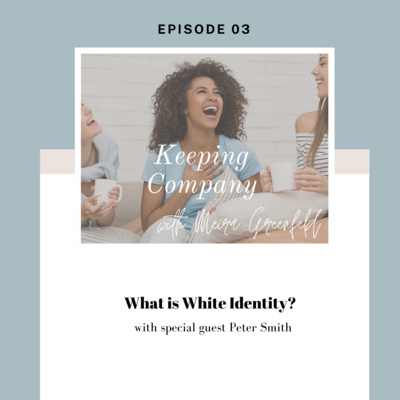
Episode 3: What is White Identity?
Our final segment in my interview with Peter Smith covers White Identity and the ways in which society incorporates and excludes individuals according to various categories. Peter is a psychotherapist and artist from Glastonbury, Somerset in England with a philosophical bent as the son of two anthropologists. (This episode is family friendly, but Peter drops the S*&^ bomb in an emphatic moment).
In this episode, I ask Peter about the impact of George Floyd’s death in England where individuals also took to the streets in protest. Four thousand miles away in the UK, George Floyd’s death sparked a reaction as people recalled local losses of Black men who died while under police restraint.
Britain isn’t without its other race incidents including the current investigation of the UK Home Office regarding claims of racism following the Windrush scandal in which Black People whose families came to Britain to help rebuild it after the war were deported or threatened with deportation.
Peter provides a fascinating theory as to why otherwise rational people hold inconsistent positions with respect to issues regarding race.
We conclude with a possible solution and introduction to Peter’s lovely dog Pitt.
I open the episode asking Peter what it means to be “white.”
The book Peter refers to on identity is by Iain McGilchrist called The Master and His Emissary: The Divided Brain and the Making of the Western World. You can contact Peter or find out more about his psychotherapy practice or thoughts on identity by visiting his website PeterSmithCounselling.com.
As a business strategist and mindset/identity coach, I help people see who they truly are and through that knowledge, that self-knowing, I help them stand strong in their own power and have the courage to choose the path forward that will lead to the most fulfillment. You can find me on social media on Instagram, on facebook in an online supportive community for anti-racist advocacy or on my website providing education, marketing and diversity training for service providers interested in working with BIPOC individuals.
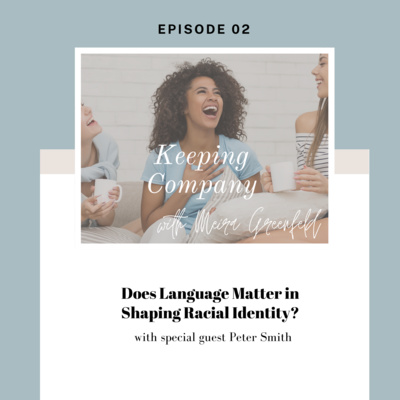
Episode 2: Does Language Matter in Shaping Racial Identity?
Please join me as I continue to talk to Peter Smith, a psychotherapist and sculptor who hails from Glastonbury, Somerset in the UK about various experiences that shape his identity. In this episode we continue to talk about the legacy of colonialism and how it has affected people’s identities. We reflect on the different forces at play during colonization and the nuances that affect relationships today among different “designated” races.
We also explore some of the language used around racism and consider the impact of new vocabulary to describe our experiences around race. Language around race matters. How does it matter to you?
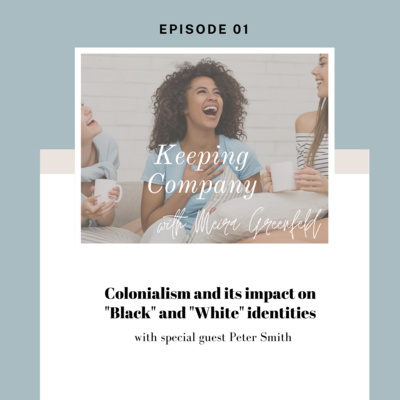
Episode 1: Colonialism and Its Impact on Black and White Identities
In today's episode, Meira interviews Peter Smith, an artisan and psychotherapist from the UK. Peter was born in Jamaica, but left as a young child to live in the United States and then moved from the United States to England when he was eleven years old. In this episode, we explore the impact of colonialism on one's sense of self. Peter's experience allows us an interesting opportunity from which to explore intersecting identities and social constructs of race. Peter describes himself as a White male with privilege. He also refers to himself as Jamaican. In a relatively short period of life, he experienced three different environments, each with its own unique perspective of racial hierarchy. How did this affect his sense of self and identity? Come join us as we also explore differences of lived racial experience in the United States, England and Jamaica.
You can contact Peter and learn more about his therapeutic approach at www.petersmithcounselling.com.